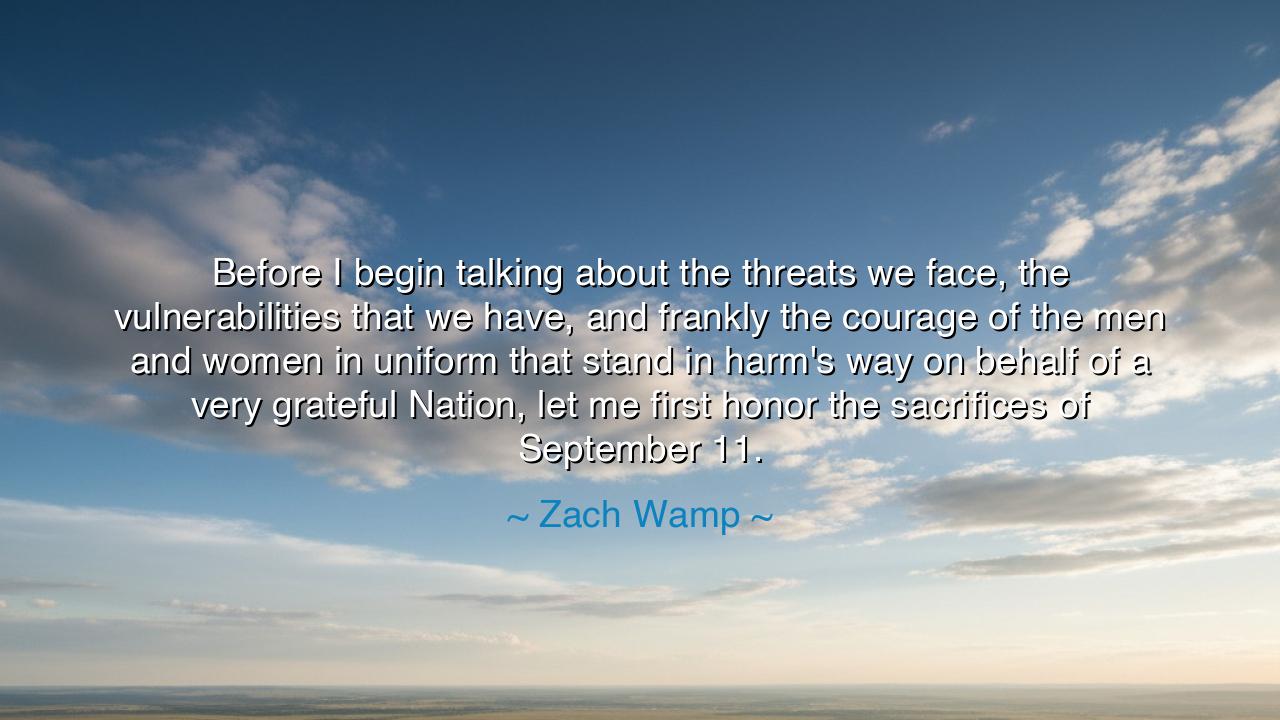
Before I begin talking about the threats we face, the
Before I begin talking about the threats we face, the vulnerabilities that we have, and frankly the courage of the men and women in uniform that stand in harm's way on behalf of a very grateful Nation, let me first honor the sacrifices of September 11.






“Before I begin talking about the threats we face, the vulnerabilities that we have, and frankly the courage of the men and women in uniform that stand in harm’s way on behalf of a very grateful Nation, let me first honor the sacrifices of September 11.”
Thus spoke Zach Wamp, an American statesman whose words echo the solemn spirit of remembrance and unity that rose from the ashes of tragedy. In this statement, he reminds us that before we speak of power, defense, or security, we must first bow our heads in gratitude. For behind every policy, every act of courage, every measure of protection, there lies a deeper foundation—the sacrifice of those who gave their lives, and the enduring grief and bravery of those who survived. It is a call not only to honor the fallen, but to remember that courage and compassion are the twin pillars upon which every great nation stands.
The origin of this quote lies in the shadow of one of history’s darkest mornings: September 11, 2001. On that day, the skies over America were pierced by fire and sorrow. Thousands of innocent lives were taken in acts of unspeakable violence, and the world watched as towers fell and hearts broke. Yet amid the ruin, something immortal rose—the courage of firefighters who ran toward the flames, the unity of strangers who carried each other from the smoke, the quiet tears of a nation that vowed never to forget. Wamp’s words were spoken in remembrance of that spirit. He understood that to speak of national strength is hollow without first acknowledging the human cost of freedom.
“Let me first honor the sacrifices.” In those words lies a truth as old as civilization: that remembrance is the foundation of moral strength. A nation that forgets its dead loses its soul. In ancient times, the Greeks built altars to their fallen warriors, not merely to mourn them, but to renew their own courage by recalling the cost of liberty. So too must we, in our modern age, carry forward the names and stories of those who perished on that September day—not as symbols of loss alone, but as beacons of resilience, reminding us of what unity and faith can endure.
Wamp’s reflection also honors the men and women in uniform, those who, in the years that followed, stood as sentinels of safety and hope. It is easy for the comfortable to forget that peace is guarded by sacrifice—that while some sleep in freedom, others stand watch in foreign lands or face unseen dangers at home. The courage of such souls, whether in the dust of Manhattan or the deserts beyond the sea, flows from the same eternal well as the bravery of the heroes of 9/11. In every generation, there are those who carry the burden of protection on behalf of the rest, their valor a living testament to what Wamp calls “a very grateful Nation.”
Let us pause, then, and remember a single moment from that day—the story of FDNY Captain Patrick Brown, who led his men upward through the burning stairwells of the North Tower. As others fled downward, he climbed, knowing the odds but refusing to abandon those still trapped. His final words, recorded over the radio, were simple and steadfast: “We’re still heading up.” In those words lives the spirit that Wamp honors—the unwavering courage that faces fear not with despair, but with duty. The captain never returned, but his example endures, whispering to all who serve: true courage is not the absence of fear, but the triumph of purpose over fear.
From this remembrance springs a lesson that every generation must learn anew. To live freely is to live responsibly—to remember those who suffered for the sake of peace, to cherish the liberties that others defended with their lives, and to stand with courage when called. The threats and vulnerabilities of the world will always change, but the strength of a people lies not in their weapons or wealth, but in their unity, gratitude, and moral resolve. To honor sacrifice is to promise that it was not in vain.
So, my child, take these words to heart. Honor before action. Gratitude before ambition. Remembrance before power. Before you speak of your own battles or fears, remember those who gave all they had so that you might live without terror. Live each day in a way that honors their courage—serve your community, comfort the suffering, and stand for what is just, even when it costs you comfort. For in doing so, you become part of the same sacred lineage of heroes who turned tragedy into triumph, fear into faith, and grief into greatness.
Thus, as Zach Wamp teaches, let every act of defense, every pursuit of progress, begin with honor—the honor of remembrance, the humility of gratitude, and the courage to uphold the legacy of those who stood in harm’s way for the sake of a nation’s soul.






AAdministratorAdministrator
Welcome, honored guests. Please leave a comment, we will respond soon